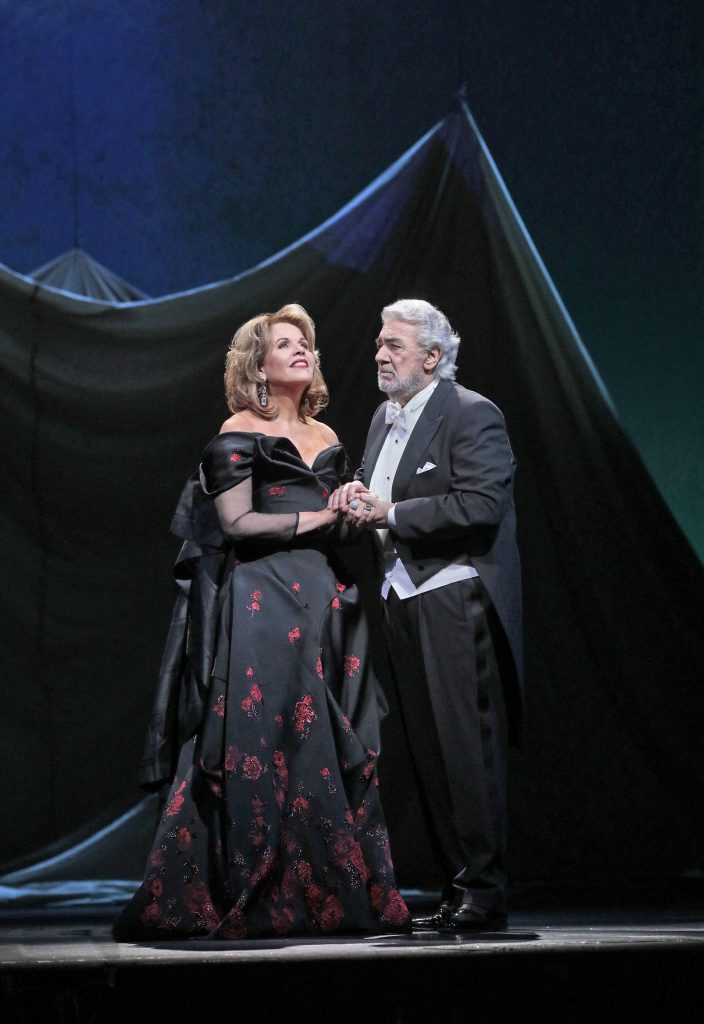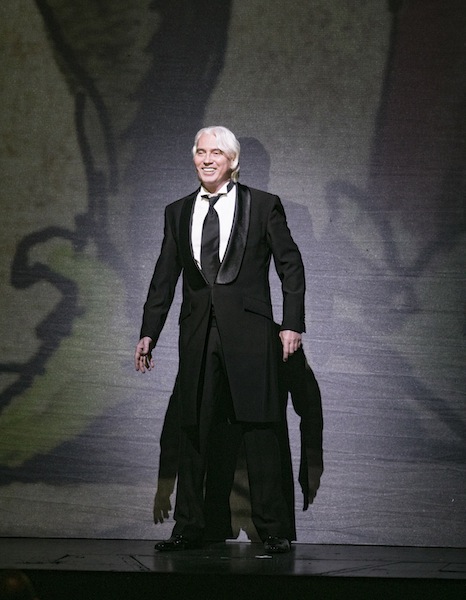The Met marks 50th anniversary at Lincoln Center with a marathon of golden singing

Renée Fleming and Plácido Domingo in a scene from Massenet’s “Thaïs” at the Metropolitan Opera’s 50th Anniversary at Lincoln Center Gala Sunday night.. Photo: Ken Howard
For fifty years now, the Metropolitan Opera House has been the crown jewel of Lincoln Center—notwithstanding its resident company’s recent financial turmoils Wallace Harrison’s grand opera house stands today as one of the world’s great temples of the performing arts.
On Sunday night, the Met held a grand bash to celebrate the 50th anniversary of the opera house, featuring many of the greatest stars currently appearing on the company stage in a five-hour extravaganza of favorite arias and scenes.
Led by Julian Crouch, the production team put together a well-oiled pageant that projected images onto flats and curtains to evoke iconic Met Opera productions with a minimum of physical scenery. Included were several well-produced tribute videos, honoring Leontyne Pryce’s star role in the opening of the house, the transformative musical stewardship of James Levine, and the beloved starburst chandeliers.
There was a good deal of superb singing over the course of the evening, though some performances felt less prepared than others, and a few of the selections were just bizarre. Thomas Adès’s The Tempest is a worthy piece, and the duet “What was before” for Miranda and Ferdinand certainly showed off the talents of Isabel Leonard and Ben Bliss. (Their gorgeous lyric singing and emotional presence was helped along by the firm off-stage singing of Dwayne Croft as Prospero.) Yet as much as one wants to give the Met credit for including something contemporary on the gala program, it seemed simply out of place.
Odd, too, were the two appearances of Michael Volle in repertoire that doesn’t particularly suit him. An argument can at least be made for the Count’s aria from Le Nozze di Figaro as an exciting item, though Volle’s baritone sounded stretched. Stranger still was Papageno’s bird-catching song, a pleasant enough ditty that doesn’t have much show-stopping potential and also was a poor fit for his voice.
This gala was at its best when the company stars came on to perform signature pieces that stand out even in operatic performance. Joseph Calleja and Sonya Yoncheva teamed up to give one of the most gorgeous renditions of the Mimì-Rodolfo scene from Act I of La Bohème that has been seen on the company stage in several years. Calleja had his very best tone on Sunday night, buttery and velvety in his middle voice, and brightening beautifully at the top of “Che gelida manina.” Yoncheva responded with ravishing colors in “Si, mi chiamano Mimì,” sporting a full soprano that soars easily into the house. She played the scene so convincingly that even in such a limited excerpt, it seemed she had crafted a full portrayal of the character. Yannick Nézet-Séguin led a superb accompaniment.
Anna Netrebko ended the first half with Lady Macbeth’s extended scene from Act I of Verdi’s Macbeth, reprising a role in which she made an enormous impression at the Met several seasons ago. No one does the mistress of the dark tower routine better, exulting in her own wickedness and showing off the enormous raw power of her voice, from her blinding high notes to her smoldering lower range. Less successful was her attempt at “Un bel di” from Madama Butterfly late in the evening–her sound wide and weary, and her Italian completely unintelligible.
It was only natural to have Javier Camarena, now the Met’s reigning leggiero tenor, sing the touchstone show aria “Ah! Mes amis” from La Fille du Régiment. His exuberant reading of the aria showed off his creamy tenor and pealing high C’s. “Bel raggio lusinghier” from Semiramide was clearly in Joyce DiDonato’s wheelhouse, yet her more striking performance by far was the simpler but emotionally charged “Va! Laisse couler mes larmes” from Act III of Werther. The aria showcased the laser-like focus of her voice, and her musical choices made the scene impossibly intimate, dropping almost to a whisper on the final phrase.

Dmitri Hvorostovsky. Photo: Ken Howard
The biggest surprise of the night was the appearance of Dmitri Hvorostovsky, whose brain tumor has kept him off the Met’s stage since 2015. In Rigoletto’s “Cortigiani,” his usually resounding baritone sounded somewhat more taxed than it has in the past, yet the ferociousness with which he sang the aria and the excitement of his return made it the evening’s most emotional moment.
Given that his career spans nearly the entire history of the current opera house, an appearance by Plácido Domingo was just about inevitable. He sounded surprisingly strong in “Nemico della patria” from Andrea Chenier, bringing a fierce dramatic presence and summoning up impressive smoke even in his rather thin baritone range. Thaïs’s Athanaël was also a fairly good vocal fit for him, though he seemed somewhat less sure of the role, joining Renée Fleming for a duet of “Baigne d’eau tes mains.” Fleming, for her part, was in particularly fine voice for the duet, as well as for Le Nozze di Figaro’s “Porgi, amor,” though her swoopy interpretation did not match particularly well the guarded emotions of the Countess.
Vittorio Grigolo gave two arias, and overplayed them both, as is his habit. He got away with it somewhat in Roméo et Juliette’s “Ah! Lève-toi, soleil,” filling in for Juan Diego Florez and reprising his fervid account of the aria from this season’s new production. And in something of a preview of next New Year’s Eve, he offered a hysterical “E lucevan le stelle” from Tosca, skewing the tempo and making absurd dynamic choices. He has a brilliant, powerful voice, but the tenor got in his own way at every turn, throwing in a gratuitous pianissimo in a climactic moment just to show off, and emoting so heavily in spots that it began to wear on his singing.
Among an endless slew of other highlights, Željko Lučić gave his deliciously snarling take on Iago’s aria “Credo in un Dio crudel” from Otello. Stephanie Blythe and David Daniels were sublime in their account of the duet “Son nata a lagrimar” from Giulio Cesare, the only baroque item on the program. René Pape was riveting and brought his luscious burgundy tone to Boris Godunov’s mad scene. Concertmaster David Chan sparkled in the violin solo from I Lombardi, followed by an intense performance of the scene “Qual volutta` trascorrere” with Angela Meade, Michael Fabiano, and Günther Groissböck.
The chorus had several chances to shine, starting with “From Alexandria, this is the news,” from Barber’s Antony and Cleopatra, the first opera staged in the Lincoln Center house. A beaming rendition of the entrance of the guests from Act II of Tannhäuser opened the second. At 11:05, alas, the finale of Act II of Aida felt like an afterthought, confetti cannons notwithstanding.
Sharing most of the conducting duties with Nézet-Séguin was company regular Marco Armiliato, who was impeccably competent. After his tribute video, James Levine led the latter quarter of the program—the orchestra was in fine voice under his baton, though this stretch also featured the only real ensemble problems of the night.
Really, it was Nézet-Séguin who was the star in the pit, leading the orchestra brilliantly across a range of rep, finding every imaginable color and creating real dramatic moments out of one-off arias and scenes. Even as the whole company made a point of celebrating Levine’s vital imprint, applauding him from the stage at the final curtain, it was Nézet-Séguin who was standing center-stage, seemingly the focus of all the energy in the room. Forging the next chapter of Met history will be his task, and after his work on Sunday night he certainly seems poised to make the most of it.
Posted May 08, 2017 at 7:48 pm by Juan Carlos Calderón
One for the ages!
One hundred anniversary any one?.